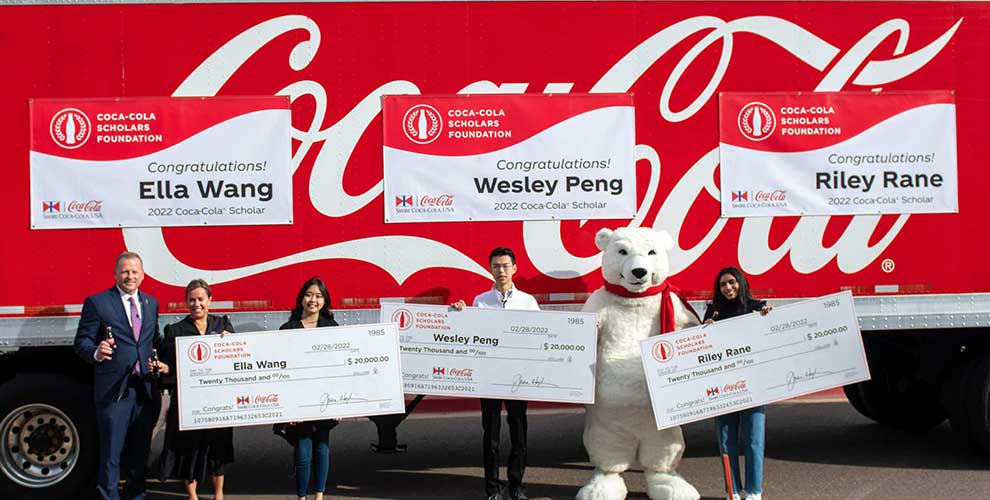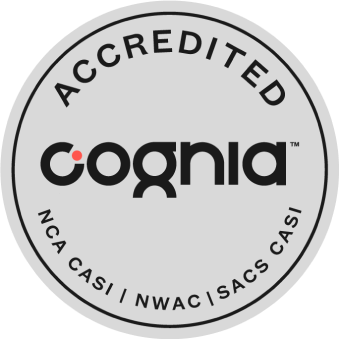BASIS Charter School Students Named Coca-Cola Scholars: An Interview with Wesley Peng and Riley Rane
The Coca-Cola Scholars Program Scholarship is an achievement-based award that has provided students with more than $78 million in educational support. We are incredibly proud of the three BASIS Charter School students who won this scholarship this year.
We got a chance to sit down with two of these scholars and ask them about their journey.
Congratulations on being named Coca-Cola Scholars and receiving a $20,000 scholarship! Please introduce yourself.
My name is Wesley Peng. I go to BASIS Scottsdale, and I’ve been there for the past eight years.
Hi, I’m Riley Rane. I was born and raised in Scottsdale, and I’ve been at BASIS for eight years, five of which have been at my current school, BASIS Scottsdale.
How did you find out about the Coca-Cola scholars program and what prompted you to apply?
Wesley: I found out about the Coca-Cola scholarship from some of my fellow classmates and peers. Listening to them and learning from them about the opportunity really made me want to apply.
Riley: So, I found out about this scholarship through a couple of friends of mine who were in the upper grades. They recommended that I apply, because BASIS really prepares you in terms of academic rigor.
Now, I know that you were somewhat surprised when you found out you were Coca-Cola scholars. So, tell us a little bit about how you found out. And what was the first thing that crossed your mind when that truck pulled in?
Wesley: We were called into our school, not about the scholarship, but to do a short video for our Senior Project. We were outside sitting on a bench, and then we turn around and see this huge Coca-Cola truck with three ginormous banners on it. One of them said my name, and we started screaming and yelling. We had faculty, teachers, other students, and the principals all there to support us.
Riley: Since we’re actually out of school for our third trimester, we were called in by our counselor for a Senior Project interview. I was super excited to share it, and they took us to a spot outside where they had all these cameras set up. Then this Coca-Cola truck pulls up into the parking lot. I don’t think any of us actually registered what was going on. It honked its horn and we saw our names on the side of the truck. I remember we all jumped up at the same time! It was a huge surprise for us.
Tell me a little bit about how BASIS prepared you to become Coca-Cola scholars, and who in particular helped you succeed?
Wesley: We’ve had eight years of wonderful academics. A lot of teachers encouraged us to not only explore ideas inside the classroom but pursue research and other endeavors outside the classroom. I’ve met Mr. Peacher and Mr. Witz, both at BASIS Scottsdale, and they were instrumental in my development.
My senior quote is, ‘There are friends, there is family, and there are friends that become family.’ And I’m very fortunate that at BASIS Scottsdale, I’ve been able to share eight years with this family.
Riley: I’m grateful that BASIS has offered me the opportunity to take a bunch of AP classes in STEM and humanities. I think exploring these subjects has really influenced my interest to go deeper outside of the classroom.
There’s definitely a lot of people who have helped me throughout this journey. But one teacher that I would like to single out is Ms. De Blas. I took her capstone narrative medicine project, and it’s been super influential in my Senior Project. It dealt with understanding how medicine is both a science and an art, and how it is more than just discovering new diseases. It’s really about treating and caring for the people who have the disease.
Wesley, your Senior Project is tackling health inequities and underserved populations in Arizona. I understand you want to make advanced technology accessible to underserved hospitals. What specifically led you to this research?
My Senior Project is tackling health equity, specifically in many of our underserved and rural populations within Arizona. My motivation for this project was really witnessing the startling inequities within our different communities. I’ve had the opportunity to both shadow and work in a variety of different hospital settings. This includes federally qualified health centers, as well as some of our best hospitals Honor Health, Mayo Clinic and Banner University Medical Center. Just witnessing the differences and disparities between these institutions in two areas was really startling. In fact, some areas I saw were understaffed and really needed resources.
Riley, I understand your project was born out of a very personal story. Can you tell me a little bit about switch adaptive toys and what led to this research?
In 2020 I observed a young girl named Mia who had a very rare neurodegenerative condition. It was impossible for her to move her body beyond, a slight twitch of her arms or legs. For Mia, and other children like her, their condition makes pressing those small buttons on toys really difficult, because it requires a lot of fine motor skills.
I found out about these toys called Switch Adaptive Toys. They are essentially toys that are connected to a larger button that’s easier for children to press. So, I made some. I made a few for Mia, but unfortunately, she passed away before I could give them to her. What I ended up doing was donating them to therapy clinics, and schools that serve these special needs children. Places like my local school district, Paradise Valley.
Considering how passionate you are about it, tell me about your post-graduate plans as far as continuing your research. Where you want to go with it?
Wesley: I think the field of health equity is something I really want to continue within college. Many of the institutions I’m looking at have centers for health equity. I think I can further this research in different areas. I can also increase the knowledge that I have gained through my limited time interning at these different hospitals.
Some of my favorite moments have been sharing about it at different conferences. One of my favorite conferences, the National Health Policy Conference gathers a bunch of experts, from the CDC director to local high school students, to discuss health disparities in our country. I want to continue going to these conferences and be an advocate for those who don’t have the ability to speak up for themselves.
Riley: In college, I’m hoping to study biomedical engineering, and become a physician. Spending time with children who could benefit from technology, and making switch adaptive toys has really influenced that decision. I want to help make medicine more equitable, and accessible to all people.
I am also working on developing a low-cost handheld medical device that can detect pathogens from very small volumes for low resource settings. Areas that lack the expensive and extensive lab equipment that we have in America and other developed countries.
What advice would you give to students who are coming into their final year of BASIS and are preparing for Senior Projects?
Wesley: I would say choose a topic that you’re really passionate about. And for graduation, my advice is to just cherish the time that you still have left with your friends and your teachers. You won’t see them that often after you start your Senior Project.
Riley: I would tell them to choose the capstone classes that they are very interested in, and subjects that they would like to learn more about. Decide what you want to accomplish and who you want to impact through your Senior Project.
All right, so I am going to ask you to fill in the blank. BASIS is ______.
Wesley: BASIS is a family that you cherish for your whole life.
Riley: BASIS is a community of passionate, driven students, and supportive teachers who seek to impact the world by spreading their knowledge.
Thank you again for taking the time to speak with and good luck to you both!
Find out college guidance coordinators help students like these achieve greater success through college counseling.
Interested in BASIS Charter Schools? Visit our website to learn about enrollment, campus tours, and school events. You can also read about our successful students who recently were named Flinn Scholars.






